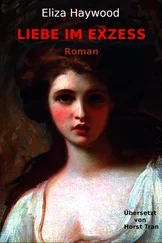But while the Count and Chevalier were thus Employ’d, the Rival Ladies past their Hours in a very different Entertainment, the despair and bitter Lamentations that the unfortunate Amena made, when she came out of her swooning, were such as mov’d even Alovisa to Compassion, and if any thing but resigning D’elmont cou’d have given her Consolation, she wou’d willing have apply’d it. There was now no need of further Dissimulation, and she confessed to Amena, that she had Lov’d the Charming Count with a kind of Madness from the first Moment she beheld him: That to favour her Designs on him, she had made use of every Stratagem she cou’d invent, that by her means, the Amour was first discover’d to Monsieur Sanseverin, and his Family Alarm’d the Night before; and Lastly, that by her Persuasions, he had resolv’d to send her to a Monastry, to which she must prepare her self to go in a few Days without taking any leave even of her Father; have you (cry’d Amena hastily interrupting her) have you prevail’d with my Father to send me from this hated Place without the Punishment of hearing his upbraidings? Which the other answering in the Affirmative, I thank you, resum’d Amena, that Favour has cancell’d all your Score of Cruelty, for after the Follies I have been guilty of, nothing is so dreadful as the Sight of him. And, who wou’d, oh Heavens! (continued she bursting into a Flood of Tears) wish to stay in a World so full of Falshood. She was able to utter no more for some Moments, but at last, raising herself on the Bed where she was laid, and endeavouring to seem a little more compos’d: I have two Favours, Madam, yet to ask of you (rejoin’d she) neither of ’em will, I believe, seem difficult to you to grant, that you will make use of the Power you have with my Father, to let my Departure be as sudden as possible, and that while I am here, I may never see Count D’elmont. It was not likely that Alovisa shou’d deny Requests so suitable to her own Inclinations, and believing, with a great deal of Reason, that her Presence was not very grateful, left her to the Care of her Women, whom she order’d to attend her with the same Diligence as herself. It was Evening before the Count came, and Alovisa spent the remainder of the Day in very uneasie Reflections; she knew not, as yet, whether she had Cause to rejoyce in, or blame her Fortune in so unexpectedly discovering her Passion, and an incessant vicissitude of Hope and Fears, rack’d her with most intollerable Inquietude, till the darling Object of her Wishes appear’d; and tho’ the first sight of him, added to her other Passions, that of Shame, yet he manag’d his Address so well, and so modestly and artfully hinted the Knowledge of his Happiness, that every Sentiment gave place to a new Admiration of the Wonders of his Wit; and if before she lov’d, she now ador’d, and began to think it a kind of Merit in herself, to be sensible of his. He soon put it in her Power to oblige him, by giving her the History of his Brother’s Passion for her Sister, and she was not at all backward in assuring him how much she approv’d of it, and that she wou’d write to Ansellina by the first Post, to engage her coming to Paris with all imaginable Speed. In fine, there was nothing He cou’d ask, refus’d, and indeed it would have been ridiculous for her to have affected Coyness, after the Testimonies she had long since given him of one of the most violent Passions that ever was; this fore-Knowledge sav’d abundance of Dissimulation on both Sides, and she took care that if he should be wanting in his kind Expressions after Marriage, he should not have it in his Power to pretend (as some Husbands have done) that his Stock was exhausted in a tedious Courtship. Everything was presently agreed upon, and the Wedding Day appointed, which was to be as soon as every thing cou’d be got ready to make it Magnificent; tho’ the Count’s good Nature made him desirous to learn something of Amena, yet he durst not enquire, for fear of giving an Umbrage to his intended Bride; but she, imagining the Reason of his Silence, very frankly told him, how she was to be dispos’d of, this Knowledge made no small Addition to his Contentment, for had she stay’d in Paris , he could expect nothing but continual Jealousies from Alovisa; besides, as he really wish’d her happy, tho’ he could not make her so, he thought Absence might banish a hopeless Passion from her Heart, and Time and other Objects efface an Idea, which could not but be destructive to her Peace. He stay’d at Alovisa’s House ’till it was pretty late, and perhaps they had not parted in some Hours longer, if his impatience to inform his Brother his Success, had not carried him away. The young Chevalier was infinitely more transported at the bare Hopes of being something nearer the Aim of all his Hopes, than D’elmont was at the Assurance of losing his in Possession, and could not forbear rallying him for placing the ultimate of his Wishes on such a Toy, as he argu’d Woman was, which the Chevalier endeavouring to confute, there began a very warm Dispute, in which, neither of ’em being able to convince the other, Sleep at last interpos’d as Moderator. The next Day they went together to visit Alovisa, and from that time were seldom asunder: But in Compassion to Amena, they took what Care they could to conceal the Design they had in Hand, and that unhappy Lady was in a few Days, according to her Rival’s Contrivance, hurried away, without seeing any of her Friends. When she was gone, and there was no farther need of keeping it a Secret, the News of this great Wedding was immediately spread over the whole Town, and every one talk’d of it as their particular Interests or Affections dictated. All D’elmont’s Friends were full of Joy, and he met no inconsiderable Augmentation of it himself, when his Brother receiv’d a Letter from Ansellina, with an Account, that Belpine’s Wound was found not Dangerous, and that he was in a very fair way of Recovery. And it was concluded, that as soon as the Wedding was over, the Chevalier should go in Person to Amiens, and fetch his belov’d Ansellina, in order for a Second, and as much desir’d Nuptial. There was no Gloom now left to Cloud the Gaiety of the happy Day, nothing could be more Grand than the Celebration of it, and Alovisa now thought her self at the end of all her Cares; but the Sequel of this glorious Beginning, and what Effect the Despair and Imprecations of Amena (when she heard of it) produc’d, shall, with the continuance of the Chevalier Brillian’s Adventures, be faithfully related in the next Part.
End of the First Part.
LOVE in Excess : OR, THE Fatal Inquiry, A NOVEL.
Part the Second.
By Mrs. Haywood.
Each Day we break the bond of Humane Laws
For Love, and vindicate the common Cause.
Laws for Defence of civil Rights are plac’d;
Love throws the Fences down, and makes a gen’ral waste
Maids, Widows, Wives, without distinction fall,
The sweeping deluge Love, comes on and covers all.
Dryden.
Конец ознакомительного фрагмента.
Текст предоставлен ООО «ЛитРес».
Прочитайте эту книгу целиком, купив полную легальную версию на ЛитРес.
Безопасно оплатить книгу можно банковской картой Visa, MasterCard, Maestro, со счета мобильного телефона, с платежного терминала, в салоне МТС или Связной, через PayPal, WebMoney, Яндекс.Деньги, QIWI Кошелек, бонусными картами или другим удобным Вам способом.












